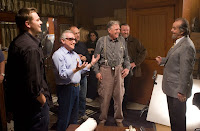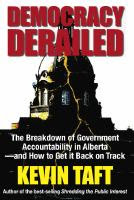Three articles today on democracy in Alberta from Larry Booi, David Evans, and Marco Adria.
Category: Democracy
where are the rolling heads?
As Ed Stelmach continues to defend the AEUB, Tory Minister Mel Knight is refusing to discipline anyone in the AEUB for hiring four private investigators to spy on a group of Alberta farmers and their lawyers.
“They discussed in hindsight that some of the things could have been handled differently and will be using this as a learning opportunity for the future. There will be no disciplinary measures at this time,” Knight’s spokesman Jason Chance said.
So, a provincially appointed tax-payer funded public body hired four private investigators to spy on ordinary Albertans and it’s a “learning experience?”
There are no repercussions?
No heads are going to roll?
No “review” of security policies?
“There are some very obvious security threats to oil and gas production and we shouldn’t discount that, but that is a totally different matter from public engagement in hearings,” said Lois Harder, a specialist in Canadian politics. “The effort to keep insisting this is a security issue is a ruse.”
“It’s trumped up.”
Democracy in Alberta just took another shot, Harder said.
“It’s very clear that if there is a threat of violence you call the police, not a private investigator who has no power to stop a threat of violence,” Harder said.
This would have been a perfect opportunity for Ed Stelmach to step up and lead by saying that this type of behavior is unacceptable. Instead, he towed the AEUB line. Albertans should be furious.
(Sheila Pratt also has some intersting thoughts on this issue)
 First of all, I would just like to say that I was very glad to see The Departed emerge victorious during last weekend’s Academy Awards as Best Picture and Best Director for Martin Scorsese. Well deserved.
First of all, I would just like to say that I was very glad to see The Departed emerge victorious during last weekend’s Academy Awards as Best Picture and Best Director for Martin Scorsese. Well deserved.
If you’ve noticed a break between posts, it has everything to do with the other stuff I keep myself busy with in my other life. I’m actually the campaign manager for a campaign of which I will not mention here. Ask me on March 9.
I’m looking forward to the upcoming Spring session of the Alberta Legislature. Just as I was excited when Alberta Liberal Leader Kevin Taft announced an aggressive legislative agenda in the face of the “Conservative oppositon” as Taft called the Stelmach Tories, my good friend Duncan seems just as excited about Stelmach. It should be interesting to see how the session plays out. Rookie Premier, rookie Ministers, new dynamic within the Tory caucus. Power politics at play. Does the opposition smells blood? All-party committees? Two upcoming by-elections!
Will Alberta be raised to the level of legislative democracy shared by such beacons of democracy as the Republic of Vanuatu and the Federated States of Micronesia? We shall see.
Also, on another note, municipal politics are heating up in Edmonton as Councillors and Councillors-to-be are buying new walking shoes and warming up their campaign engines for an October 2007 election…
“With political change so rare, one-party politics has become entrenched in Alberta. The forces that drive political change in other jurisdictions – the legislature, public inquiries, interest groups, opposition parties, the media, and so on – have adapted to this reality in order to cope, or have been deliberately gutted, or have simply deteriorated to the status of a sideshow. As a result of this one-party dominance, democracy in Alberta has been pushed off the rails. It’s time to get it back on track.”
This is how Alberta Liberal Leader Kevin Taft finishes the introduction of his new book “Democracy Derailed: The Breakdown of Government Accountability in Alberta – and How to Get it Back on Track.” I’ve had the chance to read through an advanced copy of the book and I have some thoughts as it is released today.
Democracy Derailed covers a wide range of political and ethical transparency and accountability issues in Alberta’s long-time Tory-dominated political scene. Throughout the 110-page book, Kevin Taft recounts his experiences as an MLA and leader of the Official Opposition in dealing with Alberta’s democratic deficit as well as presenting positive solutions on how to make democracy better in Alberta.
The issues addressed in the book range from Alberta’s lack of whistle-blower protection for public servants and the devolution of power from the elected Legislative Assembly to the lack of power held by Alberta’s Auditor General and the irresponsible use of FOIPP legislation to block opposition research and the lack of resources allotted to Opposition Caucus Offices in Alberta compared to those allotted to the PC Members Caucus and opposition caucuses in other provinces.
One of the interesting facts that Taft highlights is the lack of power held by Alberta’s Public Accounts Committee:
“Alberta’s Public Accounts Committee can meet once a week only when the legislature is sitting, which is all of three months per year. During approximately a dozen 90-minute meetings, the committee must review the spending of 24 provincial government departments with a combined budget of $24 billion.
That’s not all. Unlike the federal Public Accounts Committee, Alberta’s Public Accounts Committee cannot submit a report to the legislature. Legislators outside of Alberta find this restriction hard to fathom. Conservative Member of Parliament John Williams said “It’s shocking. I cannot believe a government majority would use their capacity to set the rules like that.””
According to Taft, underlying many of these problems is the near merger between the Government of Alberta and the Progressive Conservative Association of Alberta (which formed government in 1971). This is problem which would occur after any political party has governed for over 30 straight years. Examples Taft uses include the appointments of partisan Tories as elections officials, the Calgary Ward 10, Kelley Charlebois, and Alberta Securities Commission scandals, the partisan nature of the Public Affairs Bureau, and the fluid movements of Rod Love and Peter Elzinga through Government, business, and the PC Party.
The book is also complemented by a website (www.democracyderailed.ca) which includes links and pdf documents sited in the book (such as Ralph Klein’s infamous plagiarized Chile paper), along with an online interactive message board and an online quiz.
The timing of the book is probably better than Taft and the Alberta Liberals had originally planned. With new and untested Tory Premier Ed Stelmach still learning the ropes, a March/April 2007 sitting of the Legislature, and a potential Fall 2007/Spring 2008 provincial election, Democracy Derailed will hopefully raise some much needed attention and debate on some serious problems facing democracy in Alberta.
Provincial Affairs Columnist Graham Thomson has started a great contest!
If you’ve been reading my columns in The Journal, you’ll know that I am running a contest.
1st Prize: A rare golden lapel pin commemorating the 100th Anniversary of the Alberta Legislature. You can’t buy this anywhere and is the same official pin worn by the MLAs.
2nd Prize: Hardcover picture book: “100 Years at the Legislative Assembly of Alberta: A Centennial Celebration.”Rules: Write a brief essay of 100 words or less on the topic: “How Can We Improve Democracy In Alberta.”
You can write in prose or in poetry. In my column I said there’d be extra points if you can do it as a limerick — but that does NOT mean you must do it as a limerick. Everyone who has entered so far has written a poem. I wouldn’t mind some prose.
Deadline is Wednesday, December 20.
E-mail me here or my other address: gthomson@thejournal.canwest.com
So far, I’ve spoken to 2-3 political types who are already working on their entry… in prose or in poetry… I’m working on mine…
inspiration.
How I yearn for a leader like President Jed Bartlet.
(Props to Sam for the YouTube link)
From interlocutor. I recommend you read the full post.
Further afterthought: someone commented on this blog earlier that giving the Tories $5 is no big deal, since you can subversively give 5-10 times that much to the Liberals or NDs. I hereby challenge everyone who gave $5 to the Tories on that basis to make that contribution to an opposition party which best matches their values so as to undo the damage done by giving money and validation to the one-party-state given.


